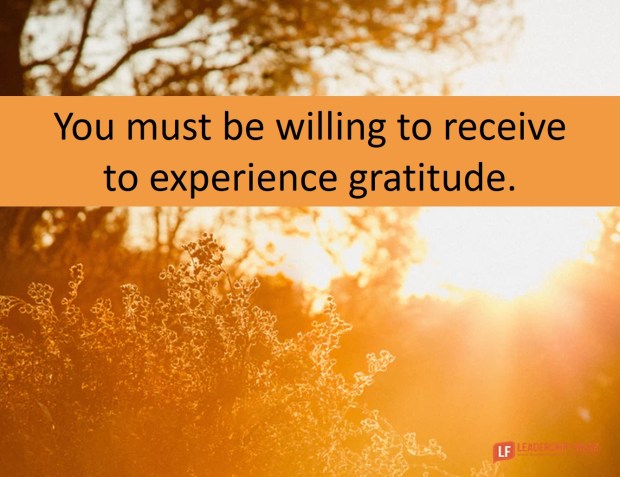The Science of Gratitude
The more you learn about gratitude, the more it becomes a magic elixir. Robert Emmons, one of the world’s leading experts on gratitude, says…
Gratitude has the power to:
- Heal.
- Energize.
- Change lives.

Defining gratitude:
Gratitude is an affirmation of goodness in the world. You recognize that you have received gifts and benefits.
Gratitude is a recognition that the source of the goodness we have received is outside ourselves. The good things you achieve are made possible in part by the goodness others extend to you.
Gratitude is an affirmation that you are not self-sufficient. Emmons says that gratitude strengthens relationships, “… because it requires us to see how we’ve been supported and affirmed by other people.”
Developing gratitude:
Receive:
You must be willing to receive to experience gratitude. When you refuse to receive gifts and benefits from others, you shrink your leadership with ungratefulness.
Record:
Take one-minute every Monday morning to record something or someone you’re grateful for. Don’t worry about keeping a daily gratitude journal.
Don’t commit to spend more than 15 minutes a week writing about gratitude. You can do more. But commit to something so small that you can’t fail.
Put your gratitude practice on your calendar so you won’t forget it.
When you write:
- Be as specific as possible.
- Elaborate on details. More detail on fewer items is better than a long list.
- Focus on people.
- What would life be like without certain people in it?
- Consider good things as gifts, not something you expected.
- Remember and record good surprises.
- Revise if you see yourself repeating.
- Commit to be consistent whether it’s once a week or more.
- Don’t over-commit. One to three times a week is more effective than every day.
The above list is adapted from “Gratitude Journal.”
How might leaders take their gratitude practice to the next level?

Many managers and leaders follow Joseph Stalin’s view that “…Gratitude is a sickness suffered by dogs…”
Send us more sick dogs. 🙂
Managers can take gratitude to the next level by being grateful for their team. their team makes them who they are. For example if they have a great team managers need to practice gratitude as a strong team make the manager look successful even if they are not.
Thanks Gerry. Think about where you would be without the people around you. That should help with gratitude.
There are some who irritate you, but if you think about it, they’re making great contribution.
One of the spiritual gurus in India said:
“Gratitude and disturbance cannot Co-exist”
Such a powerful emotion that Gratitude will erase all negativity instantly which is good for the individual.. Being grateful is selfish but perfect way to live life.
Dan, Grateful for your regular blog filled with wisdom and ideas for self improvement
Thanks CV. It’s difficult to be grateful and angry, envious, jealous, fearful, or worried at the same time. Great point.
While lying in a hospital bed for over a month, I realized I was not counting my blessings, but counting my curses. Both were equally true and valid; however, only the counting of my blessings made an improvement in my life.
I offer a thought that Gratitude emits feelings for both the giver and the receiver. Neither can describe their feelings but both know they have a feeling of gratitude. Thank You